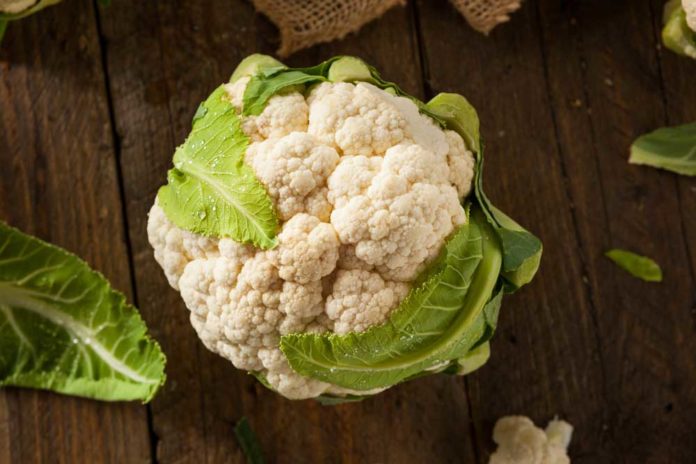Cauliflower Facts and Health Benefits
- Cauliflower is apart of the cruciferous family, stemming from the New Latin word Cruciferae meaning “cross-bearing,” with the four petals of the leaves resembling that of a cross.
- A typical cauliflower can grow from 8 to 30 inches in both height and width, weighing an average of one pound. In 2014, Pete Glazebrook set an astonishing Guinness World Record for growing the largest cauliflower in existence, growing 6 feet wide across the leaves and weighing in at 60 pounds, 9.3 ounces!
- Leaves are required for the white head’s development, protecting the cauliflower head from the sunlight. In fact, without the leaves, a bunch of yellow flowers would appear and the cauliflower would be inedible.
- As mentioned, consuming white food products is oftentimes discouraged in a nutritious diet, although cauliflower breaks the rule. But in addition to offering rich nutrients in its white form, cauliflower also comes in varietal colors, including purple, orange, and green, that are actually quite vibrant.
- The nutritional content of cauliflower scores as one of the highest on the Aggregate Nutrient Density Index (ANDI), a score assigned to whole foods that contain the highest nutrients per calorie. Cauliflower supplies a mere 27 calories per cup and is a rich source of folate, pantothenic acid, biotin, dietary fiber, and vitamins C, K, and B6.
- The potent antioxidant vitamin C supplied by cauliflower promotes skin health by providing assistance in collagen production. Vitamin C also boosts the immune system and contributes to brain function.
- Although cauliflower supplies a rich nutritional value for all consumers, low-carb dieters can relish in its low-carb content and the products it can transform into. In fact, cauliflower can mimic the textures of its higher carb counterparts, including potatoes and rice, without copious calories and carbs, as a whole medium head of cauliflower supplies a total of 29 grams of carb! Find 14 cauliflower recipes to enjoy without the guilt here.
- One cup of chopped cauliflower supplies 320 milligrams of potassium all for a mere 27 calories, which is only 100 mg shy of the notorious potassium-supplying banana, offering 422 mg at 105 calories. For the same calorie equivalent, that’s 4 cups of cauliflower and 1,280 mg of potassium!
- Cauliflower may reduce the risk of cancer, all thanks to a compound it contains known as sulforaphane. But to obtain the cancer-protective effects, it is suggested to consume the cauliflower raw, as heat has shown to kill and harm the beneficial enzyme. Find a more detailed examination on how cruciferous veggies may prevent against cancer here.
- Speaking of chronic disease… Cauliflower is used to describe common health conditions related to its physical form. Along with the obvious “cauliflower ear,” colon cancer and other diseases use the cruciferous veggie as a descriptor term.
- Although cauliflower benefits outweigh the bad, its purine content should be warned with caution. High loads of purines are turned into uric acid, which may pose concern in individuals prone to or living with gout, a form of arthritis caused when excess uric acid produces crystal-like deposits in the joints, tendons, and organs.






